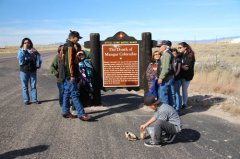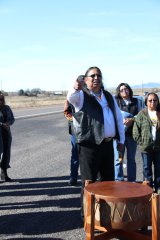Photos and article by Mary Alice Murphy
Mangas Coloradas highway monument blessed 111718
Mangas Coloradas highway monument blessed 111718
The incense of blessing for the monument
Mangas Coloradas highway monument blessed 111718
The Apache from Mescalero, with Joe Saenz, in front of the monument. An Apache boy refills the cup of blessing smoke
Mangas Coloradas highway monument blessed 111718
Gil Aguilera on the left, Joe Saenz on the right. Claudine Saenz, granddaughter of Mangas Coloradas sitting next to the monument. The ranch house in the back left sits at the site of Fort McLane, where Mangas Coloradas was murdered.
Mangas Coloradas highway monument blessed 111718
Simon Simms performs the blessing
Mangas Coloradas highway monument blessed 111718
Anthony Stewart, Joe Saenz and Hueteotl Lopez drum a song for veterans.
Mangas Coloradas highway monument blessed 111718
Stewart points out the directions of the trade routes through the area from Mesoamerica to Chihuahua to Chaco.
On Saturday, Nov. 17, 2018, a newly erected highway monument to the Death of Mangas Coloradas was dedicated and blessed.
Joe Saenz, Chihenne Apache and of Wolfhorse Outfitters, said descendants of the Apache Chief Mangas Coloradas had traveled that day to the spot where the monument had been placed. A truck turnout on the east side of the road just south of the road to the Grant County Airport was chosen for placement of the monument.
Mangas Coloradas was murdered nearby, across the highway and a bit to the northwest, at what is now a ranch and was at the time of his death Fort McLane.
Saenz said Simon Simms would perform the blessing.
Claudine Saenz of Mescalero introduced herself and said she and her sister are the grandchildren of Mangas Coloradas. "We are saddened by his death. He came to make peace. Instead he was incarcerated, shacked and soldiers were heating knives and burning his skin and stabbing him. He tried to escape. That's why he was murdered by the U.S. Artillery. He always tried to form alliances. He married his daughter to Cochise. We are all Mangas Coloradas' descendants. We speak the same language and pray in our own way. My niece is an Apache language teacher. Thank you for having us here. We are very humbled by this monument to our ancestor."
Simms said he also lives at Mescalero and is descended from Big Mouth, a Sioux leader, and his grandfather was a Kiowa from Oklahoma. "Joe (Saenz) and Gil (Aguilera) asked me to say a prayer for the monument. I will say it in English, so that more people can understand it."
After the blessing, Joe Saenz acknowledged the Fort Bayard Historic Preservation Society, which he said was instrumental in getting this historic monument placed near the site of the murder.
Doug Dinwiddie, former history professor and vice president of the FBHPS, said he had long been interested in the story of Mangas Coloradas. "We thought we should have a monument for this important historic and tragic happening."
He acknowledged the help of the New Mexico Department of Cultural Affairs; the Cultural Properties Review Committee; Tom Drake and Gretchen Brock, historical markers personnel; NM DOT for sign installation; Joe Saenz, Chihenne Apache; Fort Sill Apache, Mescalero Apache, San Carlos Apache, the Fort Bayard Historic Preservation Society and Dale Giese, as well as the late Lee Myers.
Dinwiddie read several quotes, with the first being from Chief Seattle, Native American leader: "Humankind has not woven the web of life. We are but one thread within it. Whatever we do to the web, we do to ourselves. All things are bound together. All things connect."
From Martin Luther King, Jr., Dinwiddie quoted: "I refuse to accept the view that mankind is so tragically bound to the starless midnight of racism and war that the bright daybreak of peace and brotherhood can never become a reality… I believe that unarmed truth and unconditional love will have the final word."
And the third was from Winston Churchill: "Courage is what it takes to stand up and speak. Courage is also what it takes to sit down and listen."
He thanked everyone for being there for the blessing.
Aguilera spoke next. "I grew up in Hurley and joined the service. My grandparents were native Chiricahua. Before my grandfather died, he asked me to protect all these areas. They are ours." He waved his hand in all directions to show the Apache lands.
In 2005, we did a healing ceremony at the site of Mangas Coloradas death. "This area is called Ojo Caliente de Apache Tejo. Through the cottonwoods to Lampbright, all these drainages are full of Apache ruins. What can we do now? We can preserve history and the locations. The aquifer that fed water to our people goes all the way into Chihuahua. We have to move to preserve Fort Bayard and its 21 springs. I am asking the Hurley mayor and others to support Santa Clara for Fort Bayard. I am asking the mining company to allow us to have honoring and healing ceremonies at these locations. We just want healing. The country promised us a large reservation. We got nothing. We need to make some changes to allow the Apache to do private ceremonies for their homeland."
Three drummers came forward to do a powwow-style song for veterans. They were Joe Saenz, Anthony Stewart and Hueteotl Lopez, using Stewart's large drum.
A Mr. Chavira asked for helpers in cleaning up the Hurley Cemetery. "We got wreaths for our Hurley Cemetery veterans. We will put 36 in Hurley and six in San José. It will be an annual event. We hope other communities will join us. It will take place at 10 a.m. Dec. 15. My grandfather is buried at Fort Bayard."
[Editor's Note: The same day at 10 a.m., Wreaths Across America will have a ceremony for those buried at the Fort Bayard National Cemetery, where wreaths will be placed on most of the gravesites.]
Aguilera noted that he and Simms are Native American veterans. "We all met in Chihuahua for the placing of the monument for Victorio."
Steward spoke in Apache to his fellow Apaches, who were present. He said, in English, "These north and south trade routes went from Mesoamerica, from Chihuahua to Chaco."





